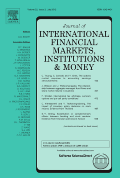
Journal of International Financial Markets Institutions & Money
Scope & Guideline
Innovating Research in International Finance
Introduction
Aims and Scopes
- Financial Market Dynamics:
The journal explores the complexities and interconnections of global financial markets, focusing on phenomena such as volatility spillovers, liquidity dynamics, and the impact of macroeconomic policies. - Institutional Analysis:
Research often investigates the role of institutions in shaping financial outcomes, including the governance structures of banks, the influence of regulations, and the effects of political risk on investment. - Sustainable Finance and ESG:
There is a notable emphasis on the integration of environmental, social, and governance (ESG) factors into financial decision-making, reflecting the growing importance of sustainability in finance. - Behavioral Finance:
The journal includes studies on investor behavior, market sentiment, and the psychological factors that influence trading decisions, particularly in the context of new financial technologies and cryptocurrencies. - Global Economic Interactions:
Research frequently examines the implications of international trade, capital flows, and economic policy uncertainty on financial markets, emphasizing the interconnectedness of global economies.
Trending and Emerging
- Fintech and Digital Transformation:
The rise of fintech continues to be a major focus, with research exploring its impact on market efficiency, financial inclusion, and the disruption of traditional banking models. - Climate Risk and Sustainable Investing:
The integration of climate risk into financial decision-making and the growth of sustainable investing are emerging as critical areas of research, reflecting the increasing importance of ESG considerations. - Cryptocurrency and Blockchain Research:
There is a growing body of literature examining the implications of cryptocurrencies and blockchain technology for financial markets, including their effects on volatility, regulatory responses, and market behavior. - Behavioral Insights in Finance:
Research is increasingly focusing on behavioral finance, particularly how investor sentiment and psychological factors influence market dynamics, highlighting a shift towards understanding human behavior in financial contexts. - Global Economic Policy Uncertainty:
The impact of global economic policy uncertainty on financial markets is emerging as a significant theme, as researchers seek to understand how such uncertainties affect investment decisions and market stability.
Declining or Waning
- Traditional Banking Models:
There appears to be a waning focus on traditional banking structures and models, as the rise of fintech and alternative financial systems takes precedence in research. - Conventional Risk Management Techniques:
Research on conventional risk management practices is decreasing, likely overshadowed by the growing interest in innovative risk management strategies that incorporate technology and behavioral insights. - Static Economic Theories:
There is a noticeable decline in the application of static economic theories, with a shift towards more dynamic models that account for real-time data and market behaviors.
Similar Journals

European Journal of Finance
Unlocking the complexities of financial systems and markets.European Journal of Finance is a prestigious publication specializing in the domains of finance, economics, and econometrics, published by Routledge Journals, Taylor & Francis Ltd. Established in 1995, this journal has become a vital resource for researchers, practitioners, and students, contributing significantly to the understanding of financial systems and markets. With its Q1 ranking in the Economics, Econometrics and Finance category, it stands out for its rigorous peer-reviewed articles that explore innovative theories, models, and empirical studies. The journal's impressive Scopus ranking of 35 out of 242 highlights its impact and relevance within the field, with an 85th percentile standing that underscores its importance to current financial research. Although it does not offer open access, the European Journal of Finance remains a cornerstone for those seeking to delve deeper into the complexities of finance, equipped with insights that drive both academic inquiry and practical application.
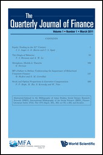
Quarterly Journal of Finance
Fostering Dialogue and Discovery in Financial ResearchThe Quarterly Journal of Finance, published by World Scientific Publishing Co. Pte Ltd, serves as a vital resource for the global academic community in the fields of Finance, Economics, and Strategy and Management. With an ISSN of 2010-1392 and E-ISSN 2010-1406, this journal boasts a respectable impact factor reflective of its standing, being ranked in the Q2 quartile across multiple categories in 2023. The journal's diverse scope includes innovative research and critical reviews that address current issues in financial practices and economic strategies, making it a pertinent platform for scholars and industry professionals alike. Despite its lack of open access, the journal's rigorous selection process ensures the publication of high-quality, impactful research. The Quarterly Journal of Finance is particularly distinguished for its commitment to advancing knowledge and fostering dialogues within its converging fields, proving to be an indispensable asset for researchers, professionals, and students eager to stay abreast of developments from 2011 to 2024 and beyond.
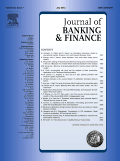
JOURNAL OF BANKING & FINANCE
Elevating Academic Discourse in Finance and EconomicsWelcome to the Journal of Banking & Finance, a premier publication in the fields of finance and economics, expertly published by Elsevier. With its esteemed Q1 ranking in both the Economics and Econometrics and Finance categories for 2023, this journal frequently garners significant attention from researchers, professionals, and academics alike. Established in 1977, it has become a crucial resource for the latest research and advancements in banking and financial services, influencing policies and practices on a global scale. The journal's commitment to high-quality, peer-reviewed content ensures that it not only contributes to academic discourse but also drives real-world financial innovation. As part of the respected Elsevier publishing collection, the journal's rigorous standards and comprehensive analysis serve as indispensable tools for those seeking to understand and navigate the complexities of the financial landscape. Located in the Netherlands, the Journal of Banking & Finance continues to play a vital role in shaping the future of financial research through its impactful insights and research contributions.
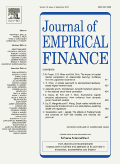
Journal of Empirical Finance
Empowering finance through rigorous empirical research.Journal of Empirical Finance, published by Elsevier, stands as a key resource in the areas of finance and economics, with a definitive focus on empirical studies. As a prominent journal since its inception in 1993, it has made significant strides in contributing to the academic community, evidenced by its soaring categorization in Q1 for Finance and Q2 for Economics and Econometrics as of 2023. With an ISSN of 0927-5398 and an E-ISSN of 1879-1727, the journal emphasizes robust, data-driven analysis to inform both theoretical and practical aspects of financial research. While access options do not include open access, the journal ensures that its content remains accessible to a diverse audience of researchers, professionals, and students. It fosters a platform for innovative research and discourse, significantly impacting the fields of finance, economics, and econometrics. The Scopus rankings further bolster its reputation, placing it in the 61st percentile in both categories, reflecting a commitment to high-quality research output. As the journal continues to evolve, it invites contributions that push the boundaries of empirical finance, enabling a deeper understanding of financial mechanisms that drive global economies.
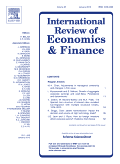
International Review of Economics & Finance
Empowering Scholars with Rigorous Research Insights.International Review of Economics & Finance is a premier academic journal published by ELSEVIER, dedicated to advancing the fields of economics and finance through high-quality, peer-reviewed research. With a distinguished history dating back to 1992 and set to continue until 2024, this journal holds an impressive Q1 ranking in both Economics and Econometrics and Finance categories as of 2023, showcasing its influential role in shaping scholarly discussions. The journal’s focus on empirical and theoretical advancements makes it an essential resource for researchers, professionals, and students seeking to understand and engage with cutting-edge economic and financial theories. Indexed in Scopus, the journal ranks in the top tiers for both finance and economics, underscoring its global impact within these disciplines. Although it does not offer open access, the journal remains committed to disseminating vital insights and fostering ongoing dialogue in the academic community.
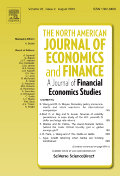
North American Journal of Economics and Finance
Uncovering insights in finance and economics.The North American Journal of Economics and Finance is a premier academic journal published by Elsevier Science Inc. since 1992, dedicated to advancing the field of economics and finance through rigorous research and scholarship. With an impressive impact factor and recognition in the Q2 category for Economics and Econometrics and Q1 for Finance as of 2023, this journal holds a significant position in the academic community, ranked #41 out of 317 in Finance and #100 out of 716 in Economics. The journal features high-quality, peer-reviewed articles that cover a broad range of topics, from theoretical frameworks to empirical analyses and practical applications. Though not an open-access platform, the journal provides valuable insights for researchers, practitioners, and students alike, promoting knowledge dissemination in the dynamic landscape of economic and financial studies. With its commitment to excellence, the North American Journal of Economics and Finance serves as an essential resource for those seeking to deepen their understanding of contemporary issues in these critical fields.
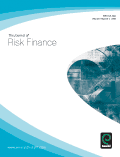
Journal of Risk Finance
Empowering research for informed financial decisions.The Journal of Risk Finance, published by Emerald Group Publishing Ltd, is a premier academic journal dedicated to advancing the understanding of risk management and finance practices since its inception in 1999. With a strong foothold within the Q2 rankings in both Accounting and Finance categories, it proudly holds a significant place in the scholarly landscape, ranking #54 out of 317 in the Scopus Economics and Finance category, placing it in the 83rd percentile. The journal aims to facilitate the exchange of innovative research and practical insights, catering to an audience of researchers, professionals, and students eager to explore contemporary issues in risk finance. While not an open access journal, it provides numerous access options, ensuring that essential findings reach a broad readership. Set in the United Kingdom and covering publications up to 2024, the Journal of Risk Finance continues to be an indispensable resource for those committed to this critical field.
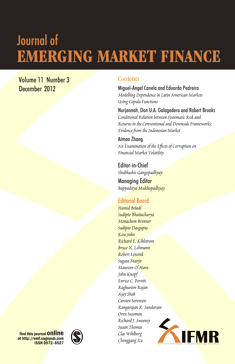
Journal of Emerging Market Finance
Unveiling Trends in Emerging Market FinanceThe Journal of Emerging Market Finance, published by SAGE Publications India Pvt Ltd, is a premier academic journal that serves as a vital resource for researchers, professionals, and students in the fields of finance and economics. Established in 2002, this journal focuses on the multifaceted dynamics of emerging market economies and their financial systems. With an ISSN of 0972-6527 and an E-ISSN of 0973-0710, it has garnered attention with its respectable Q3 rankings in both the Economics and Econometrics and Finance categories, reflecting its commitment to high-quality research. Despite its limited open-access options, the journal remains a significant platform for scholarly discussions, providing insights on emerging financial instruments, market behaviors, and economic policies in developing economies. As a continuously evolving publication, it aims to bridge the gap between theory and practice, promoting an understanding of the complexities faced in these vibrant markets, ultimately serving the academic community with relevant and impactful research until 2024 and beyond.

International Journal of Financial Studies
Championing accessible research in the world of finance.The International Journal of Financial Studies is a premier publication dedicated to advancing the field of finance through open-access research. Published by MDPI based in Switzerland, this journal offers researchers, professionals, and students a platform to disseminate their findings in an accessible format since its establishment in 2013. With its ISSN of 2227-7072 and a commendable impact reflected in its Q2 ranking in finance, it occupies an influential position among finance-related journals, as evidenced by its 65th percentile rank in Scopus. The journal encompasses a wide array of topics in finance, making it essential reading for those seeking to stay abreast of current research trends and methodologies. As an open-access journal, all articles are freely available, significantly enhancing the visibility and reach of published studies, which is crucial for fostering collaboration and innovation within the global financial community. Published continuously until 2024, the International Journal of Financial Studies is not just a source of knowledge; it is a critical contributor to the progression of financial scholarship.

JOURNAL OF FINANCIAL AND QUANTITATIVE ANALYSIS
Empowering Insights in Finance and EconomicsJOURNAL OF FINANCIAL AND QUANTITATIVE ANALYSIS, published by Cambridge University Press, is a premier peer-reviewed journal that has been at the forefront of the finance and economics fields since its inception in 1966. With a notable impact factor reflecting its Q1 status in Accounting, Economics and Econometrics, and Finance for 2023, the journal is recognized for its substantial contributions to both theoretical and empirical research. Researchers and practitioners alike benefit from its comprehensive scope, addressing critical issues in financial analysis and quantitative methods. Although the journal does not currently offer open access, it remains widely accessible through institutional subscriptions. The editorial team is committed to fostering rigorous academic discussions that shape the future of finance and economics, making it an essential resource for academics, students, and industry professionals seeking to deepen their understanding of these vital disciplines. For more than five decades, this journal has continued to be an indispensable platform for disseminating influential research, thus solidifying its role as an essential cornerstone in the financial and quantitative analysis community.